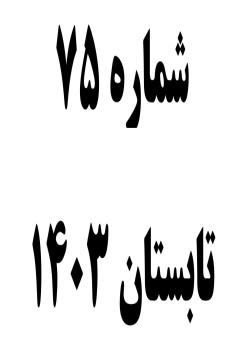Investigating and analyzing the position of having children and raising children in the Achaemenid era
Subject Areas : Epistemological and methodological researcher of historical research
1 -
Keywords: : Achaemenians, childbearing, parenting, moral themes.,
Abstract :
The category of having children and raising children is one of the main components of social development in ancient cultures. On the other hand, the number of children and the style of raising them has been very important in the intellectual ideas of Iranians. The current research, relying on the analytical descriptive method and using archaeological evidence and sources of the Achaemenid era, analyzed the situation of childbearing and child rearing in the Achaemenid era and analyzed the consequences thereof and seeks to answer this question. What is the status of having children and raising children? The findings indicate that having children and raising children in the Achaemenid era is on the one hand influenced by ancient beliefs and moral principles that existed in the Iranian plateau for many centuries and on the other hand based on the social and economic conditions of that era and also influenced by the geography of the plateau. It has been Iran. Based on this, the strategic policies of population increase and children's education style have always been the focus of the Achaemenid kings. In this regard, some Achaemenid kings including Darius I (486-522 BC) have honored childbearing by creating programs such as job security for pregnant mothers. Therefore, the need to pay attention to human capital has also been effective in the process of parenting and teaching styles, and in the form of teaching moral themes such as honesty, moderation, chivalry, teaching military techniques as a progressive model for children.
امانی، مهدی(1387). مبانی جمعیت شناسی. تهران: سمت
ایولین، رید (1389). آزادی زنان. مسائل تحلیلها و دیدگاهها. ترجمه افشنگ مقصودی.گل آذین.
آزادگان، جمشید (1372). ادیان ابتدایی. تهران: میراث ملل.
بروسیوس، ماریا (1381). زنان هخامنشی. ترجمه هایده مشایخ. تهران: هرمس.
بویس،مری (1375). تاریخ کیش زرتشت. ترجمه همایون صنعتی زاده. تهران: توس.
بیژنی، اسدالله (1350). سیر تمدن و تربیت در ایران باستان. تهران: ابن سینا.
تقوی، نعمت الله(1388. )مبانی جمعیت شناسی. تهران: آیدین.
توین بی،آرنولد (1362). تاریخ تمدن. ترجمه یعقوب آژند. تهران: مولی.
حکمت، علیرضا(1350). آموزش و پرورش در ایران باستان. تهران: موسسه تحقیقات و برنامه ریزی علمی و آموزشی
خلیلی، عباس(1389). کوروشنامه. تهران: نشر پازینه
داندمایف، محمد. آ (1381). تاریخ سیاسی هخامنشیان. ترجمه خشایار بهاری. تهران: کارنگ.
درانی،کمال(1376). آموزش و پرورش ایران قبل و بعد از اسلام. تهران: سمت
راوندی، مرتضی (1384). سیر فرهنگ و تاریخ تعلیموتربیت در ایران و اروپا. بیجا: نوبهار.
رجبی، پرویز(1380). هزاره های گمشده. ج3. تهران: توس.
رید،ایولین (1387). برادر سالاری. ترجمه افشنگ مقصودی. تهران: گل آزین.
زارع،بیژن (1389). جمعیت شناسی اقتصادی و اجتماعی. تهران: سمت.
علوی، هدایتالله (1378). زن در ایران باستان. تهران: هیرمند.
قدیانی، عباس(1387). تاریخ فرهنگ و تمدن ایران در دوره هخامنشیان. تهران: فرهنگ مکتوب.
کخ، هاید ماری (بی تا). از زبان داریوش. ترجمه پرویز رجبی. تهران: کارنگ.
گزنفون(1388). زندگی کوروش. تربیت کوروش. ترجمه ابوالحسن تهامی. تهران: نگاه.
لوکوک، پی یر (1381). کتیبه های هخامنشی. ترجمه نازیلا خلخالی. زیر نظر ژاله آموزگار. تهران: فرزان روز.
وحدتی هلان، یونس،(1391). ارزش و مقام زن در ایران باستا.ن. تهران: اختران.
وکیلیان، منوچهر(1387 ). تاریخ آموزش و پرورش ایران و اسلام. تهران: پیام نور.
هرودوت(1362 ). تاریخ هرودوت. ترجمه مازندرانی. تهران: علمی و فرهنگی.
- Briant, P. (2002), From Cyrus to Alexander, A History of the Persian Empire, Translated by Peter T. Daniels, Winona Lake, Indiana: Eisenbrauns.
- Briant,P. (1996), Histoire de l'Empire perse: De Cyrus à Alexandre, Paris: Librairie Arthème fayard.
- Brosius, M. (2021), A history of ancient Persia: The Achaemenid empire, Hoboken, New Jersey: Wiley‐Blackwell.
- Hallock, R.T. ( 1985),” The evidence of the Persepolis Tablets”, The Cambridge History of Iran. Volume 2: The Median and Achaemenian Periods. edited by Ilya Gershevitch,England:: Cambridge University Press.
- Henkelman, Wouter F., 2010b, “Xerxes, Atossa and the Persepolis fortification Archive” Annual Report 2010, Lieden/Istanbul, 27-33
- Plutarch. (1919), Plutarch's Lives, with an English Translation by. Bernadotte Perrin. Cambridge: MA. Harvard University Press. London: William Heinemann Ltd. 7.
-Dio chrysostomos(1946)discourses,loeb classical library.
-Frye.R.N.(1972)gestures of deference to royalty in ancient iran ,iranica antiqua,9.
- Malthus,T.R,(1798) an essay on the principle of population ,London
-Plato,(1995)Alcibiades I,amb,Cambridge,ma:Harvard university.
-Skjaervo.p.o.(2005)introduction to Zoroastrian ,new York:Harvard university.
- Wiesehöfer, J. (2001), Ancient persia from 550 BC to 650, AD, Translated By: AzizehAzodi I.B, London& Newyork:Tauris Publishers. - Bartholomae,ch,(1961)Altiranisches Worterbuch.Berlin:Walter De Gruyter.

